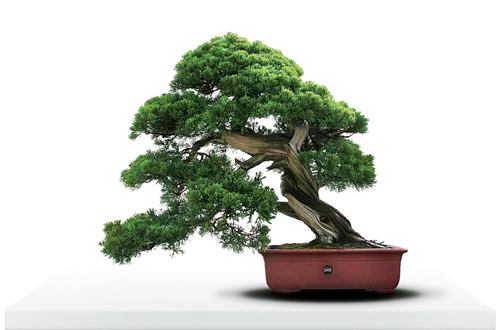

A miniature pine tree displays a dramatic shape in a pot. CHINA DAILY
Seeing these "gardens" is akin to looking at a universe in a plant pot.
The miniature pruned branches spread and twist, artistically demonstrating the vitality of nature, allowing the viewer to stop and meditate upon the circle of life. The potted landscape of penjing, also known overseas as bonsai, is a signature of top-tier garden art in Suzhou, Jiangsu province.
Since Wanjing Shanzhuang ("a mountain resort of thousands of scenes") was opened in the ruins of an ancient temple by the Tiger Hill in 1982, Tan Qiuyi has taken care of these exquisitely designed tray plants.
Over 600 penjing artworks are now showcased in the site, the largest hub of the graceful horticulture art form in Suzhou, a city known for its classical gardens.
After working for four decades, Tan is now a leading horticulturist. Reviewing the years spent with these plants, which grow extremely slowly, the 59-year-old jokes that he hardly notices the fleeting passage of time.
"If you're patient, nature will give you a wonder," he says. "It takes years to create the perfect planting."
Each penjing needs to be watered twice a day to keep the ideal moisture. Sometimes the work gives Tan a sense of duality. On one hand, he busily trims the branches to convey elegance and beauty as if he were an artist. On the other hand, physical work-like making the smelly organic fertilizer-makes him feel like a farm hand.